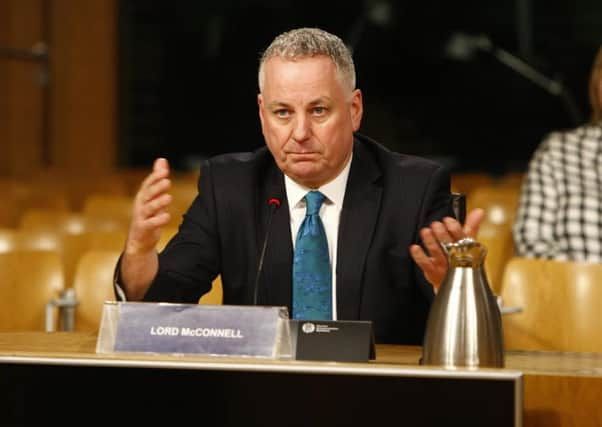Scott Macnab: No-one holding Holyrood to account


The advent of the Scottish Parliament in 1999 brought with it the ambition to create a different style of politics. The “Westminster-style” Punch and Judy approach was to be discarded. Even the new Holyrood building was to include an oval debating chamber aimed at encouraging a more collegiate approach among MSPs, as opposed to the Commons where rival party benches were stacked opposite each other, fostering more of an “us and them” approach.
The best part of two decades on, questions are emerging about the devolved approach, amid concerns that political parties wield way too much control and, just like elsewhere in the developed world, politics has lost touch with the people. Former First Minister Lord McConnell, who has generally stayed out of party political knockabout since leaving office, set out the shortcomings as he appeared before a Commission looking into the workings of Scotland’s devolved Parliament earlier this week. What was notable about McConnell’s reflections was the idea that shifting away from Westminster’s approach for sake of it may have been rash.
Advertisement
Hide AdAdvertisement
Hide Ad“To move away from adversarial and become almost non-challenging, to make it too easy to hide, I think is not the right thing,” he told the Commission. But the long-standing concerns about political parties exercising too much control over MSPs, at the expense of their duty to constituents, was also in McConnell’s crosshairs. This is most obvious in Holyrood’s committee system which has been at the centre of controversy in recent years over the politicised nature of the way it operates. The situation has become so bad that in recent years dual versions of reports have been published by committees after inquiries. Holyrood’s public audit committee infamously released two versions of a report on the proposed national police force – one backed by the SNP majority on the committee while the second “minority” report criticised the change.
The fawning approach of some backbenchers to ministers lies at the heart of the problem. Just hours after McConnell spoke on Monday, opposition members on Holyrood’s finance committee were openly exasperated by the easy ride which finance secretary Derek Mackay received from members of his own side as he gave evidence on a budget which even the impartial Scottish Parliament Information Centre (SPICe) says will mean more than £100 million of cuts to council budgets. The frustration of Greens co-leader Patrick Harvie was all too clear as he took up the questioning after the SNP’s Willie Coffey. “After that last answer, I’m not sure there’s any value in asking this,” Mr Harvie quipped.
The founding fathers of devolution simply had not countenanced the prospect of one party winning a majority in Holyrood’s complex voting system which was supposed to guard against this. But Alex Salmond pulled this off in 2011 and Scottish politics spent the following years in constitutional warfare as an independence referendum loomed. Nebulous ideas about the sanctity of Parliament fell by the wayside as the SNP used their numbers to essentially do what they pleased. It included flawed legisaltion like the Offensive Behaviour at Football Act which now looks certain to be, at least in part, repealed.
The now departed Holyrood Presiding Officer Tricia Marwick, herself a Nationalist, recognised the problem and set out proposals for committee chairs to be elected by blind ballots to ensure their independence and less control for party whips in selecting members. This is an issue which McConnell wants to see pursued to create a tranche of MSPs who may seek to build careers not as Government ministers but as high profile stalwarts of holding the Government to account. That’s what’s missing in Scotland at the moment - accountability. When was the last time a Scottish Government minister was forced to step down after a grilling from MSPs at Holyrood over major issues of the day? It hasn’t happened in 18 years at Holyrood, with McConnell observing that Scotland must be unique around the globe in this respect.
The situation does not compare well with Westminster where Commons committees have acquired a reputation as real bear pits in recent years. Rupert Murdoch found himself “humbled” as he was called to give evidence over the phone hacking scandal, while BBC chiefs also found themselves hauled over the coals on the issue of executive pay. Bosses at Amazon, Google and Starbucks have also been left reeling after grillings over tax. Perhaps an overhaul of the complex Holyrood voting system may be the answer, with time limits suggested for MSPs on the regional list to end the “jobs for life” culture which can emerge. If it is good enough for US Presidents then why not MSPs - although such an approach has previously raised concerns that it may limit the number of older candidates if they have already served in their 30s or 40s.
Perhaps more interesting is McConnell’s suggestion that candidates should be forced to choose between standing as constituency MSPs or on the regional list. This is already the situation in Wales, and Plaid Cymru leader Leanne Wood won widespread respect when she risked her Assembly place last year by giving up her “safe” seat on the South Wales list to contest the Rhondda constituency which she won from Labour. In Scotland, senior politicians over the years - including Nicola Sturgeon, Ruth Davidson and Kezia Dugdale - have all been rejected by voters in constituency ballots, but managed to cling on to their place at Holyrood through the “safety net” of the regional list. It’s easy to see why some voters might see it as a gravy train.
So will the latest Commission bring about meaningful change in Scotland’s political system? When previous Presiding Officer called for reforms, like elected committee chairs, it was rejected - by the MSPs themselves. And McConnell warned that everyone he spoke to outside the Holyrood bubble said reform was a must - while insiders, like MSPs themselves, rejected the need for change.